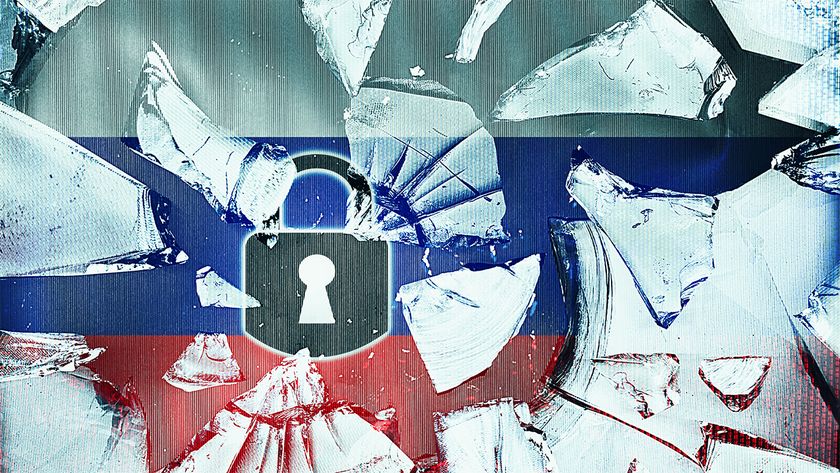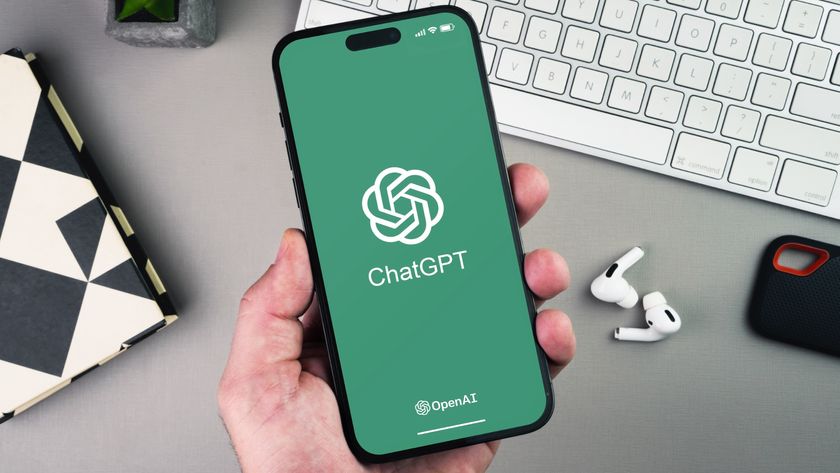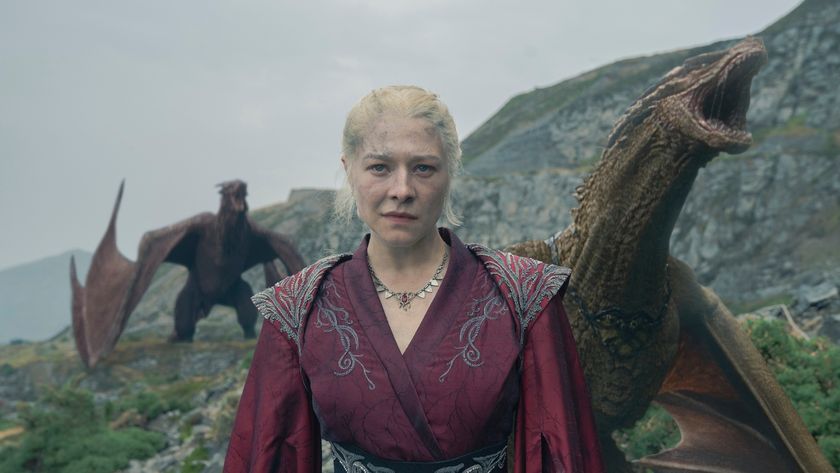How Rick and Morty's Creator Made the Jump to Video Games
Learn how Rick and Morty co-creator Justin Roiland made the jump to video games with Trover Saves the Universe.
By now, you've probably seen some of the buzz surrounding Trover Saves the Universe, an action/puzzle game from Rick and Morty co-creator Justin Roiland.

Tom's Guide awarded the game a respectable 3.5 out of 5 stars, citing its consistently hilarious dialogue and easygoing vibe. But for Roiland, making the jump from TV storytelling to video game development required a lot of adjustments, as well as a lot of unprecedented ideas; Trover Saves the Universe is an unconventional game, from an unconventional team. I got to sit down with some of the folks behind it to learn a little more about how it came to be.
A happy medium
While Trover Saves the Universe shares a general sense of humor with Rick and Morty, making a funny video game is worlds apart from making a funny video game. I asked Roiland, who is the co-founder and CEO of Squanch Games, what the process was like.
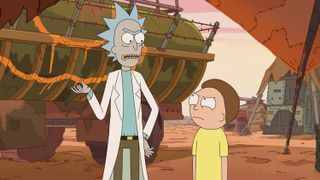
"The obvious difference with something like Rick and Morty, or any passive medium where you're just sitting and watching — all the weight [on TV] is put on pacing, story, jokes landing," he said. "Initially, my thought was that [Trover was] going to be really freeing and awesome, because if you have a really good game and have good core foundational gameplay, you have a little bit of goodwill. You don't have to be as intensely focused on everything else."
However, as production progressed, Roiland realized that Trover needed to be just as tight and funny as a TV production.
"I'm still focused on that joke that isn't hitting where it needs to hit," he explained. "It's the same kind of polish, ultimately."
Sign up to get the BEST of Tom's Guide direct to your inbox.
Get instant access to breaking news, the hottest reviews, great deals and helpful tips.
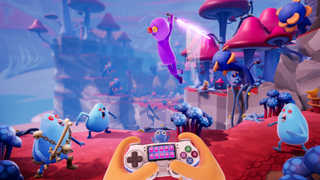
Of course, the primary difference between a TV show and a game is that the game offers unprecedented interactivity.
"People are figuratively able to reach into this thing and tinker with it. They can't do that on a show," said Roiland. "Every time we would play-test the game, or watch people play it, we would take note of something they might try to do that we didn't anticipate. We would write a line for it and try to put a reaction in the game, just to surprise people. Even if it's only 1% of the player base that tries to do this thing, they're going to be surprised."
MORE: Trover Saves the Universe Review: Pretty Schwifty
For the record, I encountered this situation during my own playthrough, when I hurled a rock at a monitor in the middle of a villain's rantings. As the object crashed to the ground, he exclaimed, "I wasn't finished yet!" It absolutely got a laugh out of me, and I was happy to learn that the game is littered with other little moments like that.
"Every time we would play-test the game, or watch people play it, we would take note of something they might try to do that we didn't anticipate. We would write a line for it and try to put a reaction in the game, just to surprise people. Even if it's only 1% of the player base that tries to do this thing, they're going to be surprised."
As a matter of fact, that villain, Gail, wasn't even supposed to be voiced by Roiland. But sometimes, the final product emerges organically, as the devs learned when Roiland recorded Gail's lines just to test them in a rendered level.
"We did a 4-hour recording of all the dialogue and all the stuff we needed to get the level up, and see if the story was as funny as we wanted it to be," Roiland said. "In game development, there are so many things that aren't working and aren't great, so many fires that have to be put out. … We have 1,000 other fires we need to put out, so we wound up just leaving the performance of me.
"You can hear I'm getting drunker throughout the course of that level," he added. "You can hear the progression of that character getting drunker and drunker. It's so f***ing funny and amazing. It's nothing like I've ever experienced in a video game, and I'm an avid gamer."
Improved improv
Even if you spend only a few minutes with Trover Saves the Universe, it's clear that the whole game has a pretty easygoing, anything-goes feel, especially in the dialogue. While Roiland and company sketched out all of the game's major plot points and set pieces, a lot of the dialogue really is just as off-the-cuff and improvisational as it sounds.
"I had the general idea of what I wanted this to be," said Roiland. "I had the general flow, but there were a lot of twists and turns that those guys [at Squanch] helped me nail down. Once we had that, then we had our larger foundational framework for the story."
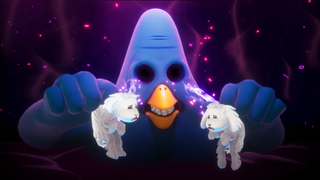
Roiland insisted that each actor should have a solid core of funny material to build from. But after that, the voice actors had a lot of leeway with the material — including Roiland himself.
"We got real loose with a lot of the stuff. … If you have an actor come in, you want to have something for them to go off of that's going to be good. It can't just be, 'here's this s***ty thing we're not going to use. You have to have decent jokes and dialogue for any actor who comes in.
"By and large, it was focused improv, focused energy. We knew what needed to be said, and where. … This is where 'whatever' happens. I would just go. I knew the game so well — it was kind of nice. I didn't really need a script. … I knew exactly what to do, what to say. We would just go for it."
This approach, more than anything else, explains why Trover feels so different from most other games, even extremely funny ones. The dialogue isn't succinct and to the point; it's whatever the voice actors thought would sound funny in the moment.
"It lends a more natural, unexpected tone. Most video games are tightly scripted. They record exactly what they need, [and] it gets cut into the game at the very end. In this case, we were recording from Day 1," Roiland explained. "It was a very different process from traditional game development in that regard. The entire studio rolled with it."
Crunch time
Even though Trover is a funny game, I thought it would be worthwhile to ask at least one serious question. Crunch — the practice of overworking an entire studio to meet deadlines, especially as a game nears release — is rampant in the video game industry right now, and it's taking a massive toll on developers. Since Squanch Games is a new studio, I asked whether it had encountered any crunch and if it had developed any safeguards in order to protect its employees.
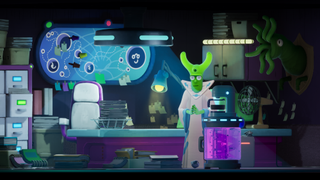
"We're a smaller studio, so it's hard to hide behind a corporate mask," Roiland said. "You want everyone to be happy and not burnt. Honestly, there's crunch in TV, too. Rick and Morty can get hairy sometimes. You never want anyone working to the point where people are losing their minds or you're breaking the law."
It's possible, though, that some level of crunch is unavoidable, especially when working with a small crew.
"You can't [develop] at the scale that we're doing it with a studio that's small unless people are really, really believing in the project and really pouring their hearts and souls to it," said Anthony Bosco, the game's narrative editor. But even so, employees in a small studio pushing themselves to finish a first game isn't quite the same as the never-ending crunch that happens at larger outfits.
"I can't imagine scaling to a size of 300 people and crunching," Bosco added. "I can't wrap my head around that. … That's not to say that we crunched superhard. We go through the production of the game relatively unscathed from some of the worst of what I've heard other people have to go through."
"While we're not perfect, the goal is to get better at making this crazy stuff so that we can not only create games that people love, but the team can have lives and families, too."
Tanya Watson, co-founder and CEO of Squanch, also weighed in. She agreed that some crunch is probably unavoidable but said that a studio should never get too comfortable with it.
"Our studio is a mix of industry veterans and up-and-coming, energetic folks, both of which have a deep passion for making games. We feel that it is not fair to ask people to trade their love of creation for their free time or their families," she said. "We are focused on creating a game-development culture where crunch is eliminated or offset as much as possible.
"Shipping Trover did have some crunchy moments, because we were building something totally new with a team that had never shipped together. … While we're not perfect, the goal is to get better at making this crazy stuff so that we can not only create games that people love, but the team can have lives and families, too."
Structured play
Trover Saves the Universe has had a lot of hype, starting with a reveal trailer during Sony's big E3 2018 event. That's unusual, considering that Trover is a 6-hour, $30 game without any microtransactions, any online components or an ongoing endgame. I asked whether a title like Trover is a fluke or if publishers might be ready to embrace shorter, cheaper, more contained games once again.
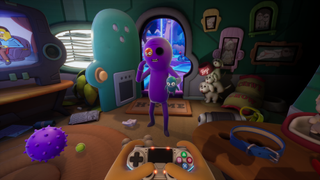
"I would love to see other games like this, as a gamer," said Roiland. "If any other devs are inspired by our game to do something like this, and they can bring the comedy, I'd love that. It'd be a Day 1 purchase.
"My favorite stuff is single-player. … These days, I want to break away from the world and the madness and experience a world and a story."
In particular, Roiland cited Donut County as an example of how indie games could engross players for short periods of time but make that time extremely memorable.
"[Donut County] is very different than what we made, but all these amazing levels — the core mechanic is so much fun."
"The music is great," Bosco added.
"It's got a great sense of humor," said Roiland. "That's an indie game. That's not AAA. I think there's room in the middle, but I don't know if publishers realize it yet."
Roiland and Bosco referenced a type of game they called triple-I: a high-budget indie or a smaller game that still has a big budget or studio behind it.
"The ones that are … not crazy 90-hour experiences," Roiland described. "They're more-focused stories. They're a bit bigger and more polished than a two-person team or a small, small, small studio team would be making. Right now, I see a big divide. We've got the indies and the AAAs, and I'd personally like to see some more middle ground."
Peripheral weirdness
We touched upon a few other interesting topics during our conversation, from who else got advance copies of Trover (Jack Black and Robert Kirkman, among others) to what Roiland thought of the Rick and Morty porn parody. ("I think it's cool. I haven't watched it all the way through yet. It's not my particular kind of porn.") But the biggest takeaway was that while Trover started out as a VR game, it's now accessible to anyone who has a PC or PS4.
MORE: 9 Best Games to Play This Month
"My biggest fear is come launch day, there's a bunch of people who assume that since they don't have VR, they're not going to be able to play," Roiland said. "It's awesome in VR … It'll blow your mind. But don't think you need a [PlayStation VR]. The jokes are just as good. Everything is just as funny and amazing."
"It's a great couch game," Bosco added. "You can play with a group of people, and everyone's going to laugh."
Having played through the game myself, I can vouch for both of those statements.
Marshall Honorof is a senior editor for Tom's Guide, overseeing the site's coverage of gaming hardware and software. He comes from a science writing background, having studied paleomammalogy, biological anthropology, and the history of science and technology. After hours, you can find him practicing taekwondo or doing deep dives on classic sci-fi.
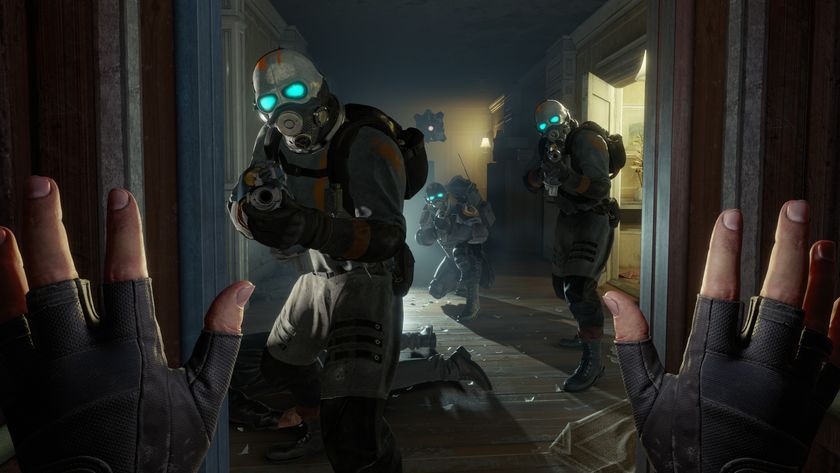
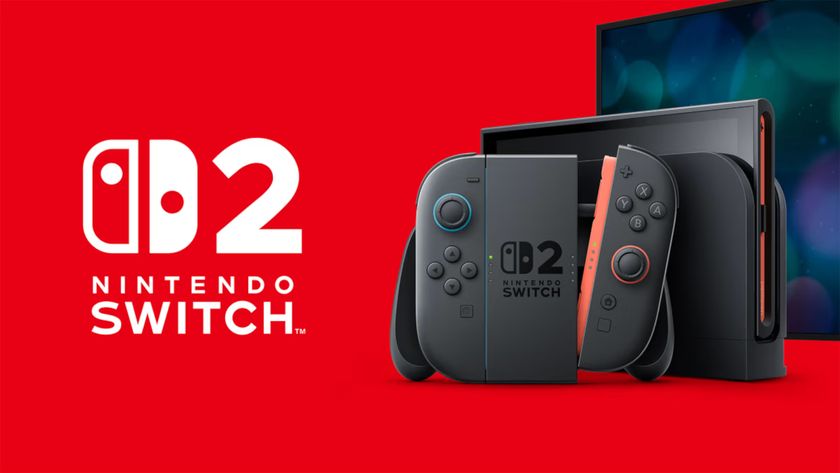
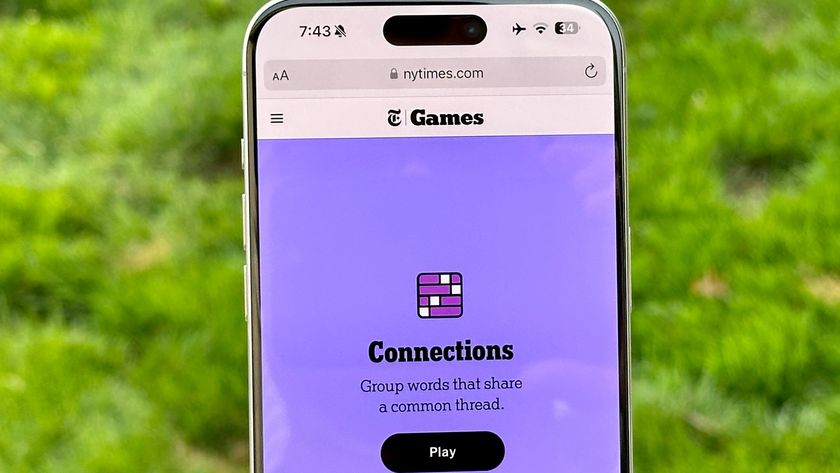

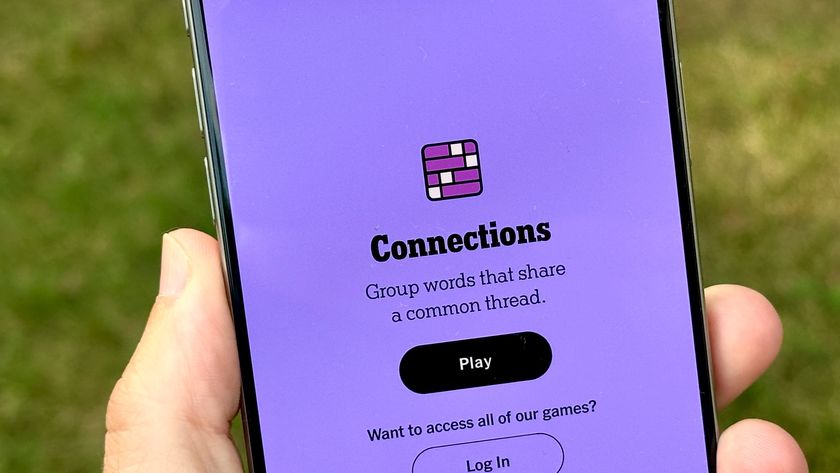

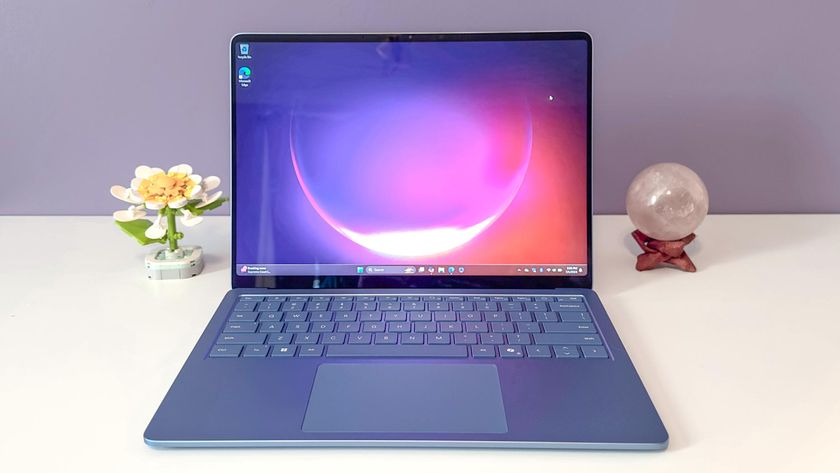
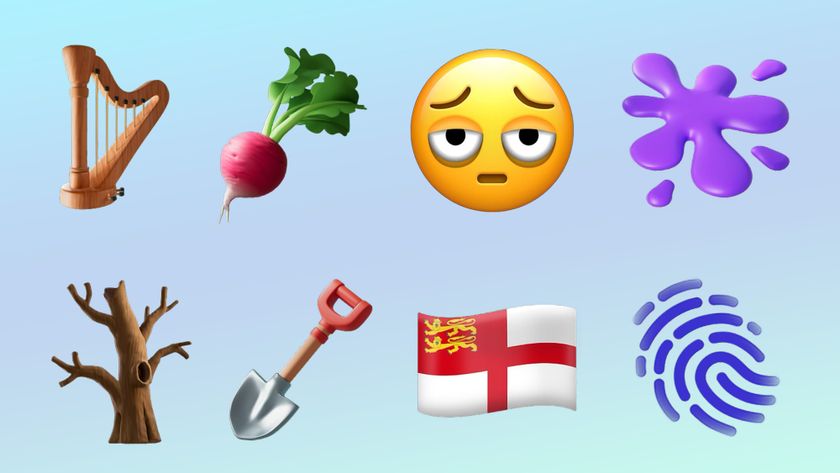


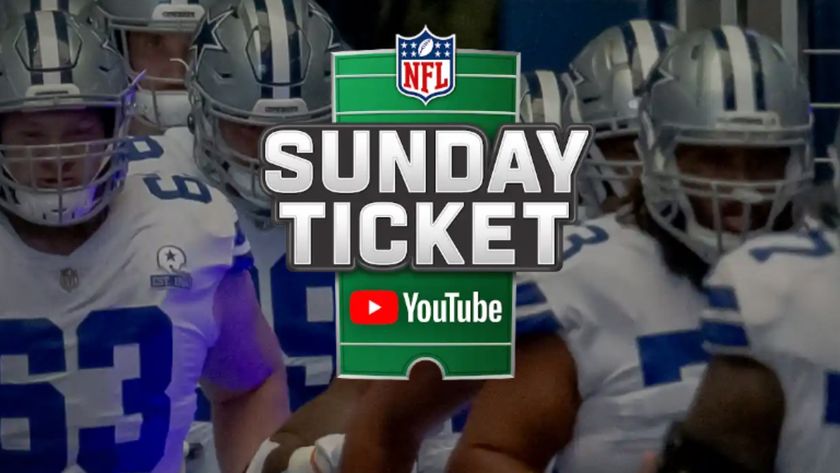
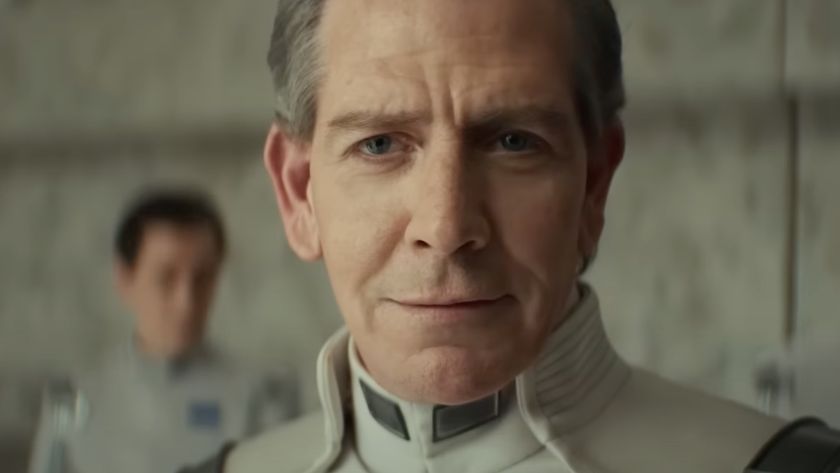
- 2


